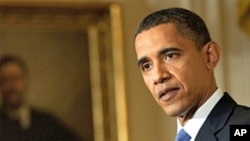Watch/Listen to President Obama's press conference on the Gulf oil spill
President Barack Obama is restricting oil drilling off U.S. coasts, after the worst oil spill in the nation's history. The president discussed the disaster in the Gulf of Mexico with reporters.
President Obama began his first solo news conference in 10 months by addressing growing criticism that he has been too passive in allowing the energy company BP to take the lead in trying to cap the gushing oil well.
"The American people should know that from the moment this disaster began, the federal government has been in charge of the response effort," said President Obama.
Mr. Obama said the government will extend for six more months a ban on new permits for deepwater oil well drilling. He is also delaying planned drilling in the Arctic Sea off Alaska.
The president spoke with reporters after reading the report on the spill from his interior secretary, Ken Salazar. He blamed his predecessors in the G.W. Bush administration for being too lax in regulating oil drilling. But he accepted responsbility for allowing the situation to continue in his presidency.
Earlier Thursday, the head of the interior department's Minerals Management Service, or MMS, Elizabeth Birnbaum stepped down under pressure.
"Salazar came in and started cleaning house, but the culture had not fully changed in MMS, and absolutely I take responsbility for that," said Mr. Obama. "There was not sufficient urgency in terms of the pace of how those changes needed to take place."
Mr. Obama said he wants Salazar to continue investigating the incident, because many questions remain unanswered.
"I continue to believe that oil production is important," he said. "Domestic oil production is important. But I also believe we cannot do this stuff if we do not have confidence that we can prevent crises like this from happening again."
As the president spoke with reporters, BP said its latest efforts to stop the oil from pouring into the Gulf were showing signs of progress. The company said, however, it would take several days to assess whether the so-called 'top kill' strategy is working.
President Obama referred to the spill as an economic and environmental tragedy.
A new USA/Today Gallup public opinion poll shows that six out of 10 American adults say the government is doing a poor or very poor job handling the spill. More than half say the same about Mr. Obama.
Meanwhile, several oil company executives were on Capitol Hill taking tough questions from lawmakers.
The chairman and president of BP America, Lamar McKay, told the House of Representatives' Committee on Natural Resources he has never seen a disaster like this one.
"The investigation team's work so far shows that this is a complex accident, involving the failure of a number of processes, systems and equipment," said Lamar McKay. "Put simply, there seems to have been an unprecedented combination of failures."
The government confirmed Thursday that the Gulf leak is the worst oil spill in U.S. history, far worse than the 1989 spill from the tanker Exxon Valdez off Alaska.




